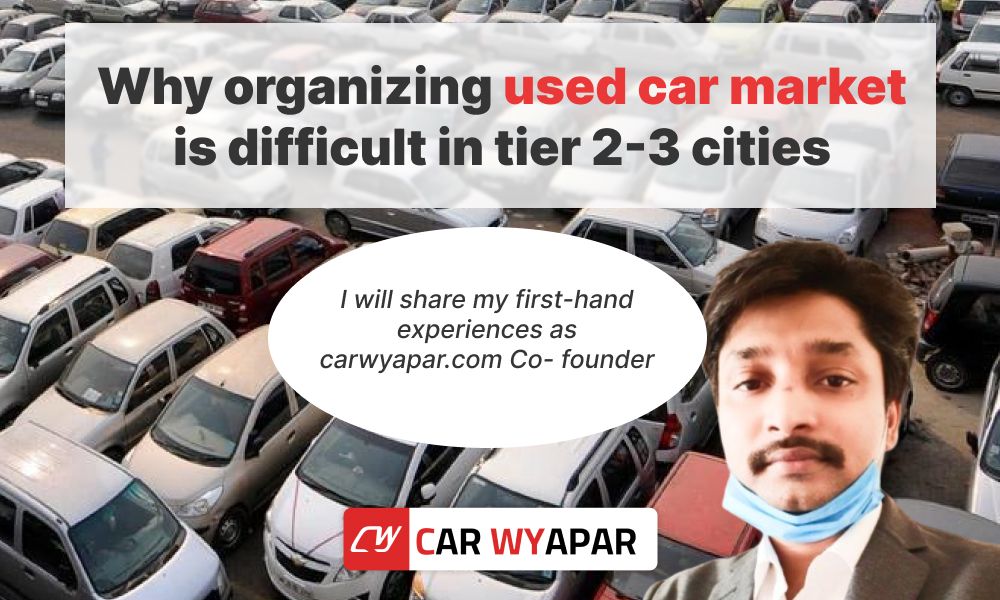Why It is Difficult to organize the Unorganized Used Car Market in tier-2 and Tier-3 Cities: First-hand Insights from Car Wypar Founder
Published On 5/5/2024, 7:35:17 pm Author Zeeshan Ali AqudusTech-first platforms facilitate lead generation and streamline processes for selling and buying cars but do not alter the workings of the informal economy. The automotive after-sales market has been organized to a pretty good extent, but there is a saturation beyond which the organization can happen. Let's read about it.

In October 2022, we invested in a local garage in Patna to explore opportunities for building a startup related to cars, such as an auto-commerce platform, a chain of car detailing services, or a used car selling platform. While exploration, we came across plethora of challenges at ground level operations.
In this article I have discussed about the used car market dynamics in a typical tier-2 and tier-3 city.
Key Takeaways from this article
- Shift in emotional connection from new cars due to scrapping policies.
- Not all aspects of the automotive industry are easily scalable.
- The used car market in India is sizable, valued at $30 billion and growing at a CAGR of 11%.
- Lack of transparency in the used car market poses challenges for buyers and sellers.
- Instances of exploitation, such as undervaluation and sales diversion, observed in the industry.
- Involvement of multiple intermediaries often leads to inflated prices and complexity for buyers.
- Some buyers opt for local dealers over larger players due to perceived personalized service.
- Lack of standardization and organization within the industry hampers efficiency and trust.
- Buyers often prefer cash transactions, leading to a preference for local dealers and cash dealings.
- The diversity and complexity of the automotive industry, coupled with varying federal regulations and consumer preferences across regions, make scaling operations difficult and resource-intensive.
Our first hand experimentation
Through hands-on experimentation, we discovered that not all aspects could be easily scaled. While exploring the car repair and maintenance sector, we came across the news of a major startup that initially seemed promising but was later found to engage in fraudulent activities to offset financial losses. This experience deterred us from pursuing that direction, leading us to focus on the used car domain. It was a high ticket size game anyway.
In the used car market, we observed several startups effectively capturing and organizing the informal market. However, our firsthand involvement in selling cars revealed unfair and non-transparent end-to-end processes that makes operations a serious challenge for an organized player.
How used car buyers and sellers are exploited
With over 30,000 parts, purchasing a used car can overwhelm even the most experienced drivers. I observed a scenario where a seller offering a Suzuki Baleno Zeta 2018 model was informed about purported issues with the timing belt and clutch plate, leading to a revised offer of INR 4.5 lakhs from the initial asking price of 5.50 lakhs. Eventually, the deal was settled at INR 4.80 lakhs. Interestingly, the same car was later pitched to a potential buyer for INR 6 lakhs, despite there being no actual issues with the vehicle.
Surprisingly, a naive customer managed to negotiate a deal for the Suzuki Baleno at 5.75 lakhs, inclusive of complimentary detailing and touch-ups. It's astonishing to realize that the local dealer made more profit from selling the Baleno than Maruti Suzuki itself! What's more intriguing is that neither the seller nor the buyer were aware of the actual transaction amounts.
A 2012 Tata Safari was acquired for just INR 1.20 lakhs because the seller was unaware of diesel ban regulations across different states. The same car was then sold to a customer from a distant rural area for a staggering INR 2.75 lakhs. However, the buyer was not informed that driving the car hassle-free until 2027 was contingent upon extending its validity for an additional five years.
At used car dealerships, I often witnessed cars undergoing extensive repair, washing, and detailing before being displayed for sale. While these cars were sufficiently repaired to run smoothly for 5000-10,000 kilometers without issues, their appearance was flawless. The dent, paint, and repairs were carried out to such an extent that the cars felt authentically 2nd hand, despite the meticulous restoration efforts.
Challenges with listing & procuring platforms
Dealers heavily utilized OLX for procuring cars, leading to an influx of spammy activity on the platform. When I attempted to list a car, I received 10 calls on the first day, all from dealers, with no direct customer inquiries. Additionally, OLX competitors also monitored the platform to procure cars and entice listers.
Several marketplaces tapped into the local dealer network to clear their stock in tier 2-3 cities, a strategic move aimed at reducing operational expenses. By leveraging the existing infrastructure and workforce of local dealers, these platforms expanded their business simply by providing leads. However this inflated the price of the used cars to a pretty good extent.
Cash deals, informal economics and tier 2-3 cities
I observed freelancing car flippers capitalizing on the resources of local businessmen who preferred operating within the shadow economy to compound their wealth. These businessmen would fund freelancers to procure cars in exchange for promising returns of 15-20% within a month. This business model relies entirely on the rapport and trust established between freelancers and businessmen. Such dealings were done mostly in cash.
In luxury car cases, the declared value on paper was intentionally understated compared to the actual value. This tactic was employed to segment transactions into accounted and non-accounted categories. Trust was pivotal in these transactions, reflecting the widespread trend of tax evasion, particularly in tier 2-3 cities.
These practices aren't exclusive to the used car industry; similar methods are prevalent in other sectors such as property dealing and land selling, especially in tier 2-3 cities. High-ticket transactions in these sectors often involve similar tactics to manage transactions, making it challenging to organize and regulate these businesses effectively.
Frugal modus operandi of local businesses
I encountered instances of internal diversion of sales among employees of used car companies like True Value and First Choice. In these cases, when a customer exchanges an old car to purchase a new one from an authorized OEM dealer, certain employees redirect these sales through local used car dealers, ultimately reducing the profits that the company would otherwise earn.
Certain dealers have partnerships with banks, which enable them to repossess cars that fail to pay EMIs. This reciprocal arrangement between banks and local dealers ensures that both parties benefit by gaining customers. The dealers get used car customers while the bank gets a prospect personal loan lead for the car!
Another significant issue arises concerning pricing. When multiple intermediaries are involved, the price of used cars tends to skyrocket, leaving little room for a fair deal. As a result, many buyers opt to purchase new cars instead. For example, a potential buyer of a used Tata Harrier 2022 model ultimately chose to buy a new Grand Vitara and was satisfied with the decision. This shift occurred due to the involvement of four intermediaries in generating the lead.
The used car market can be straightforward. All a buyer really needs to know is who is selling the car and who can assist with inspections and RTO processes. OLX attempted direct selling, but other platforms and dealers quickly turned it into a lead generation platform, resulting in a flood of spam. Getting quality leads become a daunting task.
In property dealings, people tend to overlook intermediary exploitation because properties are considered appreciating assets, providing assurance that investments will likely yield future returns. On the other hand, cars are depreciating assets. While not as substantial an investment as real estate, purchasing a car still represents a significant financial commitment. Considering the risk involved in getting a bad car, a good chunk of people also prefer sticking to local dealers because it is easier to hold them accountable in case something goes south. Fighting a legal battle with a local dealer is much easier than fighting a legal battle with unicorn startups.
Moreover, some used car buyers prefer to avoid bigger players in the market due to various reasons. Firstly, giant platforms may not always prioritize the individual needs and concerns of each buyer, leading to a perceived lack of personalized service. Additionally, these larger players often have their own set of policies and procedures, which may not align with the preferences or expectations of every buyer. As a result, some buyers feel more comfortable dealing with local dealers who can offer a more personalized and tailored experience.
Why We Decided to Build CarWyapar.com
We noticed a change in how people feel about buying cars in India. Earlier, there was a strong emotional connection to getting a new car, but now, with new policies about scrapping old cars, people don't feel the same attachment. Cars are becoming more like everyday tools than something special.
The used car market in India is significant - it's valued at $30 billion and it's growing by 11% each year. However, organizing this market isn't simple because of various factors, from trust issues to payment methods to government regulations.
Additionally, we are focusing on listing new cars as well. In the initial stages, our focus will be on these two areas, and we will adapt as we progress. We are bootstrapped, our progress might be slow till we
















